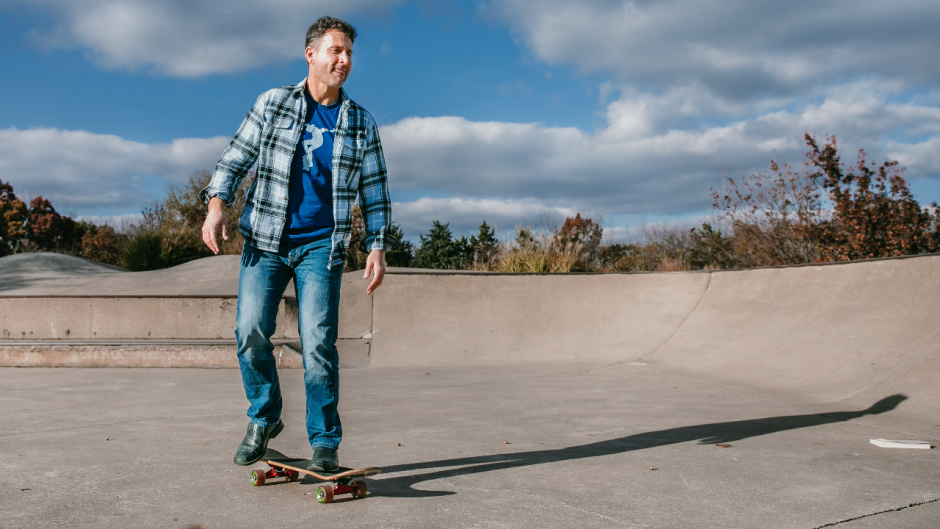
Feb. 5, 2024
Ever since Robert Petrone spent the first few years of his career teaching English and coaching basketball in the public school system, he has been curious about how to increase student success, especially for students who have historically been labeled “at-risk.”
This curiosity led to a career in academia, and Petrone – now an associate professor in the College of Education and Human Development – has been building relationships with high schools and the students in them to conduct research that seeks to answer this question and several others.
Rather than asking what’s “wrong” with students labeled “at-risk,” he focuses on where they are having success. His inquiry led him to an unlikely locale for an education researcher — a skatepark.
For several summers, Petrone got to know the skateboarders who called this skatepark home, all in the name of uncovering what could be learned about the human dynamics that take place there, and seeing if any takeaways could be applied to the modern-day classroom.
The culmination of all this work is Petrone’s latest book: "Dropping In: What Skateboarders Can Teach Us About Learning, Schooling, and Youth Development."
Read on for a Q&A with Petrone.
What is your research focus area?
A lot of my work looks at the ideas that we have of youth or adolescents, how those circulate in our society, and how that might affect the way we treat them or build curriculum for them.
Almost all the dominant ways of understanding that demographic are deficit-oriented. If you’re an adolescent, the labels already placed on you are that you’re not yet an adult, your brain isn’t fully formed, your body is out of control. If someone tells you an adolescent is “at-risk,” these deficit positionings get even more exacerbated, and you’re automatically going to download all sorts of assumptions about who those kids are and interact with them in particular ways.
So, I try to look at how we in education might reposition our own understanding and thinking of who young people are, especially those labeled “at-risk,” and how to build curriculum that might be more empowering for them.
Tell us more about how you landed on the skatepark as a place you wanted to observe.
I was working with a teacher in a school district in a rural area, and I got to know some of the “at-risk” young men in that space.
My research approach is very relational and humanizing. I’m not interested in statistics; I want to build relationality with the people I’m going to be researching. So, I asked them, “Where are you guys being successful?” And they were like, “You should come to the skatepark.”
So, I started going to the skatepark, and I hung out there for a long time, and I got to know these guys. I wanted to study this space that these guys were gravitating toward. This space was meeting their learning needs, their literacy needs, their intellectual needs, and even their relational needs. I wanted to understand what this place meant to them and what structurally was enabling this success.
What were some patterns you saw emerge?
- Learning is individual and communal.
An individual has to practice to master the tricks, but the guys I interviewed told me that what makes skateboarding skateboarding is that everyone at the park is a resource. Style is a big thing in skateboarding, and everyone is constantly learning from each other. In addition — and this was the most impactful thing for me as an educator — is that we segregate kids by age in schools. At the skatepark, you have guys of all ages practicing together, learning from each other, and it makes the environment more collegial and collaborative rather than competitive. - Failure is central to learning.
One of the guys in the book says, “You have to get it in your head that you’re going to fail, and you have to accept that reality.” At the skatepark, failing is actually supported in a way because there is an understanding that in order to develop mastery, you have to practice, practice, practice, which will involve some falling and failing. - Youth thrive when they feel they have something to contribute.
Over and over again, the guys I interviewed would say “Here—at the park—I matter. I have something to say.” And for a lot of them that was different than how their traditional school system made them feel. At the skatepark, whether it’s mentoring a younger skater or paving the way for a new trick, they said it was the emotional equivalent of being a “big brother.” They experienced an intense emotional connection and a sense of belonging, but also the sense that they had something to contribute was key.



